With zero liquor tax and a sophisticated drinkers’ market, Hongkong is gearing up to be a wine powerhouse, Liu Hongzuo reports
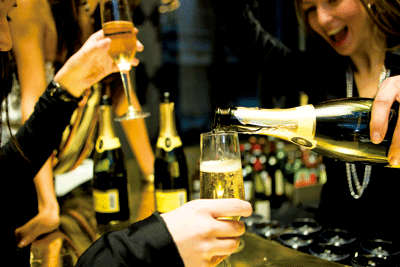 When it comes to drinking nations, China would not normally be the first country to come to mind. Yet, its history and culture is just as wine-soaked as that of the Greeks, the Spanish, French or Italians.
There is archeological evidence of wine-making in Shandong province, dating back 4,600 years. Since then, the Chinese have been using fermented sorghum to make wine and other ingredients such as rice to create different varieties of wine.
In fact, the Chinese have always been extremely particular about their booze. For instance, Maotai wine, China’s national liquor, is identified by its location – Maotai is a town in Guizhou Province – just as the Bordeaux or Champagne regions are intimately linked to their products.
Li Bai, a famous poet who lived during the Tang Dynasty, was also a legendary drinker whose nickname was the “Wine Immortal”. A compilation of his works by modern scholars revealed that about 17 percent of them were about drinking. His most famous poem, Yue Xia Du Zhuo (translated from Mandarin as “Drinking Alone Under the Moonlight”), is about passing time with wine, while experiencing loneliness, companionship, gratitude and joy with the moon as his muse.
In the rest of Asia, wine has always been part of daily life. The Japanese Kanji character for shu (in Romanji, known as sake, a Japanese rice wine) is identical to the Chinese simplified and traditional Han character jiu (alcohol, often mistranslated as wine).
The Korean pronunciation for wine is similar – ju – to the Japanese and Chinese, and its Hanja (writing) is also identical to the two other languages. Such deep linguistic roots show that Asia boasted a drinking culture long before western wines flowed into the regional consciousness.
Now Hongkong wants to take this much-relished tradition further and become the wine hub of Asia, burnishing its already sterling reputation as the core of all things commercial and gateway to the prized China market.
When it comes to drinking nations, China would not normally be the first country to come to mind. Yet, its history and culture is just as wine-soaked as that of the Greeks, the Spanish, French or Italians.
There is archeological evidence of wine-making in Shandong province, dating back 4,600 years. Since then, the Chinese have been using fermented sorghum to make wine and other ingredients such as rice to create different varieties of wine.
In fact, the Chinese have always been extremely particular about their booze. For instance, Maotai wine, China’s national liquor, is identified by its location – Maotai is a town in Guizhou Province – just as the Bordeaux or Champagne regions are intimately linked to their products.
Li Bai, a famous poet who lived during the Tang Dynasty, was also a legendary drinker whose nickname was the “Wine Immortal”. A compilation of his works by modern scholars revealed that about 17 percent of them were about drinking. His most famous poem, Yue Xia Du Zhuo (translated from Mandarin as “Drinking Alone Under the Moonlight”), is about passing time with wine, while experiencing loneliness, companionship, gratitude and joy with the moon as his muse.
In the rest of Asia, wine has always been part of daily life. The Japanese Kanji character for shu (in Romanji, known as sake, a Japanese rice wine) is identical to the Chinese simplified and traditional Han character jiu (alcohol, often mistranslated as wine).
The Korean pronunciation for wine is similar – ju – to the Japanese and Chinese, and its Hanja (writing) is also identical to the two other languages. Such deep linguistic roots show that Asia boasted a drinking culture long before western wines flowed into the regional consciousness.
Now Hongkong wants to take this much-relished tradition further and become the wine hub of Asia, burnishing its already sterling reputation as the core of all things commercial and gateway to the prized China market.
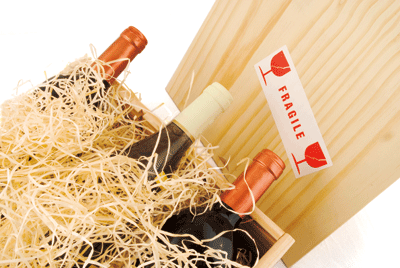 According to the Australian Wine and Brandy Corporation, Hongkong imported 13.5 million litres of wine in 2005, but consumed only about 40 percent of that delivery, or to be more specific, a figure that redounded to 0.9 litres per person over 15 years of age.
Then a very good thing happened.
In February 2008, John Tsang, Hongkong’s financial secretary, announced that the abolition of the 40 percent levy on wine and beer, which he said would help the Territory establish itself as a trading, storage and distribution centre of wine in the region.
The move naturally cheered the merchant community, which long chafed at past regulations deemed to dampen not only sales but any potential for public appreciation of the product as well. With the government’s go-ahead, Hongkong is going all out to bag the leading position in the lucrative wine stakes.
There is a worthy challenger in the neighbourhood, however. Perennial rival, Singapore also adjusted its wine levy in February 2008, taxing bottles by alcoholic content and not liquid volume. But those in the know such as the spokesperson of wine distributor Oeno believe that consumption had already been increasing even before the adjustment.
“Consumption has probably increased due to a younger generation (inclined to wine appreciation) and the increase in cross-cultural ethnic influences from the expatriates who come to Singapore,” says the expert from Oeno.
In fact, the demographics of both Hongkong and Singapore mirror each other on many levels: wines are fully imported and both are economic powerhouses hosting scores of foreign talent. But with a larger population to quench, Hongkong looks to have the advantage.
“It would probably be much easier to import wine in Hongkong than Singapore as it is tax free,” said Oeno’s spokesperson.
“It is always the bottom line for companies and savings for the company would usually translate into savings for the consumers as well.”
There is more evidence to show there is more to toast about Hongkong’s budding wine scene.
Research by the International Wine And Spirits Record showed that on a consumer level, each person of legal age in Hongkong drank an average 3.3 litres of wine in 2008 alone – three-and-a-half times more wine than the drinkers of 2005, with each year’s figures on the rise.
In comparison, Singapore averaged a mere 1.9 litres of wine per person.
According to the Australian Wine and Brandy Corporation, Hongkong imported 13.5 million litres of wine in 2005, but consumed only about 40 percent of that delivery, or to be more specific, a figure that redounded to 0.9 litres per person over 15 years of age.
Then a very good thing happened.
In February 2008, John Tsang, Hongkong’s financial secretary, announced that the abolition of the 40 percent levy on wine and beer, which he said would help the Territory establish itself as a trading, storage and distribution centre of wine in the region.
The move naturally cheered the merchant community, which long chafed at past regulations deemed to dampen not only sales but any potential for public appreciation of the product as well. With the government’s go-ahead, Hongkong is going all out to bag the leading position in the lucrative wine stakes.
There is a worthy challenger in the neighbourhood, however. Perennial rival, Singapore also adjusted its wine levy in February 2008, taxing bottles by alcoholic content and not liquid volume. But those in the know such as the spokesperson of wine distributor Oeno believe that consumption had already been increasing even before the adjustment.
“Consumption has probably increased due to a younger generation (inclined to wine appreciation) and the increase in cross-cultural ethnic influences from the expatriates who come to Singapore,” says the expert from Oeno.
In fact, the demographics of both Hongkong and Singapore mirror each other on many levels: wines are fully imported and both are economic powerhouses hosting scores of foreign talent. But with a larger population to quench, Hongkong looks to have the advantage.
“It would probably be much easier to import wine in Hongkong than Singapore as it is tax free,” said Oeno’s spokesperson.
“It is always the bottom line for companies and savings for the company would usually translate into savings for the consumers as well.”
There is more evidence to show there is more to toast about Hongkong’s budding wine scene.
Research by the International Wine And Spirits Record showed that on a consumer level, each person of legal age in Hongkong drank an average 3.3 litres of wine in 2008 alone – three-and-a-half times more wine than the drinkers of 2005, with each year’s figures on the rise.
In comparison, Singapore averaged a mere 1.9 litres of wine per person.
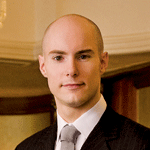 Nicolas Pierron, head sommelier of Restaurant Petrus at Island Shangri-La Hongkong, says: “Since the wine tax was removed, wine investment in Hongkong is becoming very interesting and more wine auctions are happening. At the end of last year, the only place in the world you were able to see an increase in the price of wines in auctions was here.”
Activity in this area has indeed been extraordinarily busy. In September, Zachys Wine Auction was held at the Mandarin Oriental and netted HK$38.2 million (US$4.93 million) for all of the 787 lots on the block, with seven out of 10 going to in-room bidders. (Only one in 10 bid through the internet, a sign that the method has still to gain popularity in Asia.)
Last month saw Sotheby’s auction of two private collections reaped a total of HK$61.5 million (US$7.9 million). Both collections had all their lots sold, but even more interesting was that Asian buyers made up 99 percent of total buyers.
Nicolas Pierron, head sommelier of Restaurant Petrus at Island Shangri-La Hongkong, says: “Since the wine tax was removed, wine investment in Hongkong is becoming very interesting and more wine auctions are happening. At the end of last year, the only place in the world you were able to see an increase in the price of wines in auctions was here.”
Activity in this area has indeed been extraordinarily busy. In September, Zachys Wine Auction was held at the Mandarin Oriental and netted HK$38.2 million (US$4.93 million) for all of the 787 lots on the block, with seven out of 10 going to in-room bidders. (Only one in 10 bid through the internet, a sign that the method has still to gain popularity in Asia.)
Last month saw Sotheby’s auction of two private collections reaped a total of HK$61.5 million (US$7.9 million). Both collections had all their lots sold, but even more interesting was that Asian buyers made up 99 percent of total buyers.
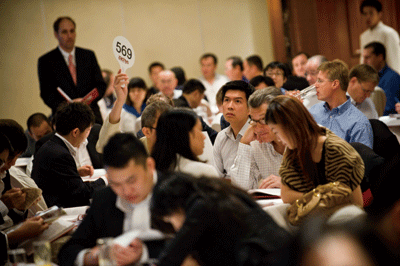 Zachys again held a two-session wine auction at the end of October at the same venue.
Elsewhere, wine fever is also on the rise, especially in the city’s lifestyle precincts where wine and cheese soirées are becoming hot events. The Hongkong Tourism Board has also joined the bandwagon, conducting the timely Hongkong Food and Wine Year, enlisting participation of many restaurants, hotels and eateries that has led to a flurry of wine-related promotions and activities.
If there is a downside to the good news, it’s that wine prices have yet to come down across the board. The reason given by restaurant managers is that they have to recoup on stocks purchased before the 2008 tax rollback.
Pierron of Restaurant Petrus comments: “It is important to provide the consumer with value for money and therefore, the hotel’s wine list is regularly updated based on market prices.”
This is a small hurdle, and one that isn’t preventing big players in the wine business from flocking to Hongkong to establish a foothold for the future.
Zachys again held a two-session wine auction at the end of October at the same venue.
Elsewhere, wine fever is also on the rise, especially in the city’s lifestyle precincts where wine and cheese soirées are becoming hot events. The Hongkong Tourism Board has also joined the bandwagon, conducting the timely Hongkong Food and Wine Year, enlisting participation of many restaurants, hotels and eateries that has led to a flurry of wine-related promotions and activities.
If there is a downside to the good news, it’s that wine prices have yet to come down across the board. The reason given by restaurant managers is that they have to recoup on stocks purchased before the 2008 tax rollback.
Pierron of Restaurant Petrus comments: “It is important to provide the consumer with value for money and therefore, the hotel’s wine list is regularly updated based on market prices.”
This is a small hurdle, and one that isn’t preventing big players in the wine business from flocking to Hongkong to establish a foothold for the future.
 Stephane Tsassis, CEO of 197-year-old champagne house Laurent Perrier, which distributes in over 100 countries, was in town recently to celebrate its partnership with Berry Bros & Rudd, a leading local wine merchant with a heritage spanning over three centuries, headed by Nicholas Pegna, its MD.
Despite the debilitating global recession, wine, according to Tsassis, was one commodity that defied depreciation. His predictions for Hongkong’s wine ambitions were nothing but optimistic.
“Hongkong’s market for champagne doubled in size in the last 10 years,” said Tsassis. “That is, a 10 percent growth every year, and (represents) by far the most aggressive market.”
He expects the upward trend to continue for another 10 years, putting Hongkong ahead of the rest of the wine-promoting pack in Asia.
Pegna adds: “While Hongkong will continue to be a very significant market, what will happen is in 10 years’ time, is that other North Asian markets (for wine) would have become very significant, such as South Korea, Taiwan and Mainland China. What you will have is a conglomeration of markets together which in concert, which would probably eclipse the level of spending we see in the United States.”
The confidence of such growth is attributed to the drinkers of Hongkong, which is observed to go for only fine-grade drinks and their ability to appreciate wines in most occasions.
Tsassis observes: “As a foreigner, I would say that every time I come to Hongkong, it’s a pleasure. Because people here like to party, to go outside, go to bars – they always have a British ‘happy hour’ mentality. It’s very appropriate for a glass of champagne.”
Pegna says: “I think the people here are serious about what they drink and they take it into consideration and that they spend a lot of money as well – that is the best indication of how serious they are.
“The demand for our wine education is very high, and indicates there is a thirst for knowledge for the drinkers to be informed in their choice. I can demonstrate that wine drinking is more serious in Hongkong than any other market. This is not a market that will accept inferior (wine) quality.”
Pierron of Island Shangri-La’s culinary jewel Restaurant Petrus shares his expert view, culled from daily interaction with connoisseur customers: “Business guests mainly prefer to stay with the classic and reputable wines (white wines from Burgundy and red wines from Bordeaux).
“There is also a huge interest in Pinot Noir from Burgundy (lighter compared with Bordeaux), and leisure travellers tend to express an interest in trying new wines and learning about them.”
The inclination for the grape leads to other passions.
“They are also keen about pairing wine with food, and with the Menu Gourmand that is offered at Restaurant Petrus, there is the opportunity to try unusual wines and new appellations.”
So if you’re about to knock back another glass – go ahead. Not only are you in the right place, it is encouraged and tax free anyway.
Stephane Tsassis, CEO of 197-year-old champagne house Laurent Perrier, which distributes in over 100 countries, was in town recently to celebrate its partnership with Berry Bros & Rudd, a leading local wine merchant with a heritage spanning over three centuries, headed by Nicholas Pegna, its MD.
Despite the debilitating global recession, wine, according to Tsassis, was one commodity that defied depreciation. His predictions for Hongkong’s wine ambitions were nothing but optimistic.
“Hongkong’s market for champagne doubled in size in the last 10 years,” said Tsassis. “That is, a 10 percent growth every year, and (represents) by far the most aggressive market.”
He expects the upward trend to continue for another 10 years, putting Hongkong ahead of the rest of the wine-promoting pack in Asia.
Pegna adds: “While Hongkong will continue to be a very significant market, what will happen is in 10 years’ time, is that other North Asian markets (for wine) would have become very significant, such as South Korea, Taiwan and Mainland China. What you will have is a conglomeration of markets together which in concert, which would probably eclipse the level of spending we see in the United States.”
The confidence of such growth is attributed to the drinkers of Hongkong, which is observed to go for only fine-grade drinks and their ability to appreciate wines in most occasions.
Tsassis observes: “As a foreigner, I would say that every time I come to Hongkong, it’s a pleasure. Because people here like to party, to go outside, go to bars – they always have a British ‘happy hour’ mentality. It’s very appropriate for a glass of champagne.”
Pegna says: “I think the people here are serious about what they drink and they take it into consideration and that they spend a lot of money as well – that is the best indication of how serious they are.
“The demand for our wine education is very high, and indicates there is a thirst for knowledge for the drinkers to be informed in their choice. I can demonstrate that wine drinking is more serious in Hongkong than any other market. This is not a market that will accept inferior (wine) quality.”
Pierron of Island Shangri-La’s culinary jewel Restaurant Petrus shares his expert view, culled from daily interaction with connoisseur customers: “Business guests mainly prefer to stay with the classic and reputable wines (white wines from Burgundy and red wines from Bordeaux).
“There is also a huge interest in Pinot Noir from Burgundy (lighter compared with Bordeaux), and leisure travellers tend to express an interest in trying new wines and learning about them.”
The inclination for the grape leads to other passions.
“They are also keen about pairing wine with food, and with the Menu Gourmand that is offered at Restaurant Petrus, there is the opportunity to try unusual wines and new appellations.”
So if you’re about to knock back another glass – go ahead. Not only are you in the right place, it is encouraged and tax free anyway.
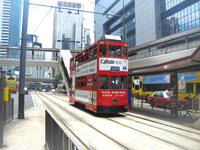 If time is on your side, take a scenic ride across Victoria Harbour between Tsimshatsui and Central via the Star Ferry. This popular and inexpensive means of public transport-cum-sightseeing dates back to the late-19th century. A nine-minute journey costs just HK$2.50 (32 cents) per person on the top deck, compared to a six-minute train ride for HK$8.50 (US$1.09) between Tsimshatsui and Central MTR stations. A fleet of 12 ferries runs at a maximum frequency of 12 minutes, and the shortest waiting time between each departing ferry is six minutes. Schedules operate from 6.30am till 11.30pm daily.
Alternatively, go for the reliable electric-powered trams that ply the routes around Hongkong Island. An average of four tram stops – the equivalent of the distance between two MTR stations – has a total travelling time of about five minutes. A flat fee of HK$2 (25 cents) for adults takes you to the major points – ask a fellow commuter for directions.
If time is on your side, take a scenic ride across Victoria Harbour between Tsimshatsui and Central via the Star Ferry. This popular and inexpensive means of public transport-cum-sightseeing dates back to the late-19th century. A nine-minute journey costs just HK$2.50 (32 cents) per person on the top deck, compared to a six-minute train ride for HK$8.50 (US$1.09) between Tsimshatsui and Central MTR stations. A fleet of 12 ferries runs at a maximum frequency of 12 minutes, and the shortest waiting time between each departing ferry is six minutes. Schedules operate from 6.30am till 11.30pm daily.
Alternatively, go for the reliable electric-powered trams that ply the routes around Hongkong Island. An average of four tram stops – the equivalent of the distance between two MTR stations – has a total travelling time of about five minutes. A flat fee of HK$2 (25 cents) for adults takes you to the major points – ask a fellow commuter for directions.
The Hongkong Food and Wine Year promotion has introduced stay-and-dine offers at hotels such as Hotel LKF by Rhombus, Metropark Hotel, The Charterhouse Causeway Bay Hotel, Island Pacific Hotel and Luk Kwok Hotel in Wanchai. Quote “HKFWY” when booking a table.


 Nicolas Pierron, head sommelier of Restaurant Petrus at Island Shangri-La Hongkong, says: “Since the wine tax was removed, wine investment in Hongkong is becoming very interesting and more wine auctions are happening. At the end of last year, the only place in the world you were able to see an increase in the price of wines in auctions was here.”
Activity in this area has indeed been extraordinarily busy. In September, Zachys Wine Auction was held at the Mandarin Oriental and netted HK$38.2 million (US$4.93 million) for all of the 787 lots on the block, with seven out of 10 going to in-room bidders. (Only one in 10 bid through the internet, a sign that the method has still to gain popularity in Asia.)
Last month saw Sotheby’s auction of two private collections reaped a total of HK$61.5 million (US$7.9 million). Both collections had all their lots sold, but even more interesting was that Asian buyers made up 99 percent of total buyers.
Nicolas Pierron, head sommelier of Restaurant Petrus at Island Shangri-La Hongkong, says: “Since the wine tax was removed, wine investment in Hongkong is becoming very interesting and more wine auctions are happening. At the end of last year, the only place in the world you were able to see an increase in the price of wines in auctions was here.”
Activity in this area has indeed been extraordinarily busy. In September, Zachys Wine Auction was held at the Mandarin Oriental and netted HK$38.2 million (US$4.93 million) for all of the 787 lots on the block, with seven out of 10 going to in-room bidders. (Only one in 10 bid through the internet, a sign that the method has still to gain popularity in Asia.)
Last month saw Sotheby’s auction of two private collections reaped a total of HK$61.5 million (US$7.9 million). Both collections had all their lots sold, but even more interesting was that Asian buyers made up 99 percent of total buyers.

 Stephane Tsassis, CEO of 197-year-old champagne house Laurent Perrier, which distributes in over 100 countries, was in town recently to celebrate its partnership with Berry Bros & Rudd, a leading local wine merchant with a heritage spanning over three centuries, headed by Nicholas Pegna, its MD.
Despite the debilitating global recession, wine, according to Tsassis, was one commodity that defied depreciation. His predictions for Hongkong’s wine ambitions were nothing but optimistic.
“Hongkong’s market for champagne doubled in size in the last 10 years,” said Tsassis. “That is, a 10 percent growth every year, and (represents) by far the most aggressive market.”
He expects the upward trend to continue for another 10 years, putting Hongkong ahead of the rest of the wine-promoting pack in Asia.
Pegna adds: “While Hongkong will continue to be a very significant market, what will happen is in 10 years’ time, is that other North Asian markets (for wine) would have become very significant, such as South Korea, Taiwan and Mainland China. What you will have is a conglomeration of markets together which in concert, which would probably eclipse the level of spending we see in the United States.”
The confidence of such growth is attributed to the drinkers of Hongkong, which is observed to go for only fine-grade drinks and their ability to appreciate wines in most occasions.
Tsassis observes: “As a foreigner, I would say that every time I come to Hongkong, it’s a pleasure. Because people here like to party, to go outside, go to bars – they always have a British ‘happy hour’ mentality. It’s very appropriate for a glass of champagne.”
Pegna says: “I think the people here are serious about what they drink and they take it into consideration and that they spend a lot of money as well – that is the best indication of how serious they are.
“The demand for our wine education is very high, and indicates there is a thirst for knowledge for the drinkers to be informed in their choice. I can demonstrate that wine drinking is more serious in Hongkong than any other market. This is not a market that will accept inferior (wine) quality.”
Pierron of Island Shangri-La’s culinary jewel Restaurant Petrus shares his expert view, culled from daily interaction with connoisseur customers: “Business guests mainly prefer to stay with the classic and reputable wines (white wines from Burgundy and red wines from Bordeaux).
“There is also a huge interest in Pinot Noir from Burgundy (lighter compared with Bordeaux), and leisure travellers tend to express an interest in trying new wines and learning about them.”
The inclination for the grape leads to other passions.
“They are also keen about pairing wine with food, and with the Menu Gourmand that is offered at Restaurant Petrus, there is the opportunity to try unusual wines and new appellations.”
So if you’re about to knock back another glass – go ahead. Not only are you in the right place, it is encouraged and tax free anyway.
Stephane Tsassis, CEO of 197-year-old champagne house Laurent Perrier, which distributes in over 100 countries, was in town recently to celebrate its partnership with Berry Bros & Rudd, a leading local wine merchant with a heritage spanning over three centuries, headed by Nicholas Pegna, its MD.
Despite the debilitating global recession, wine, according to Tsassis, was one commodity that defied depreciation. His predictions for Hongkong’s wine ambitions were nothing but optimistic.
“Hongkong’s market for champagne doubled in size in the last 10 years,” said Tsassis. “That is, a 10 percent growth every year, and (represents) by far the most aggressive market.”
He expects the upward trend to continue for another 10 years, putting Hongkong ahead of the rest of the wine-promoting pack in Asia.
Pegna adds: “While Hongkong will continue to be a very significant market, what will happen is in 10 years’ time, is that other North Asian markets (for wine) would have become very significant, such as South Korea, Taiwan and Mainland China. What you will have is a conglomeration of markets together which in concert, which would probably eclipse the level of spending we see in the United States.”
The confidence of such growth is attributed to the drinkers of Hongkong, which is observed to go for only fine-grade drinks and their ability to appreciate wines in most occasions.
Tsassis observes: “As a foreigner, I would say that every time I come to Hongkong, it’s a pleasure. Because people here like to party, to go outside, go to bars – they always have a British ‘happy hour’ mentality. It’s very appropriate for a glass of champagne.”
Pegna says: “I think the people here are serious about what they drink and they take it into consideration and that they spend a lot of money as well – that is the best indication of how serious they are.
“The demand for our wine education is very high, and indicates there is a thirst for knowledge for the drinkers to be informed in their choice. I can demonstrate that wine drinking is more serious in Hongkong than any other market. This is not a market that will accept inferior (wine) quality.”
Pierron of Island Shangri-La’s culinary jewel Restaurant Petrus shares his expert view, culled from daily interaction with connoisseur customers: “Business guests mainly prefer to stay with the classic and reputable wines (white wines from Burgundy and red wines from Bordeaux).
“There is also a huge interest in Pinot Noir from Burgundy (lighter compared with Bordeaux), and leisure travellers tend to express an interest in trying new wines and learning about them.”
The inclination for the grape leads to other passions.
“They are also keen about pairing wine with food, and with the Menu Gourmand that is offered at Restaurant Petrus, there is the opportunity to try unusual wines and new appellations.”
So if you’re about to knock back another glass – go ahead. Not only are you in the right place, it is encouraged and tax free anyway.
TIP OFF: Smart Travel Intelligence
Hongkong boasts one of the world’s most efficient transport systems and a colourful events calendar including the Food and Wine Year promotionTRAVEL SLOW
 If time is on your side, take a scenic ride across Victoria Harbour between Tsimshatsui and Central via the Star Ferry. This popular and inexpensive means of public transport-cum-sightseeing dates back to the late-19th century. A nine-minute journey costs just HK$2.50 (32 cents) per person on the top deck, compared to a six-minute train ride for HK$8.50 (US$1.09) between Tsimshatsui and Central MTR stations. A fleet of 12 ferries runs at a maximum frequency of 12 minutes, and the shortest waiting time between each departing ferry is six minutes. Schedules operate from 6.30am till 11.30pm daily.
Alternatively, go for the reliable electric-powered trams that ply the routes around Hongkong Island. An average of four tram stops – the equivalent of the distance between two MTR stations – has a total travelling time of about five minutes. A flat fee of HK$2 (25 cents) for adults takes you to the major points – ask a fellow commuter for directions.
If time is on your side, take a scenic ride across Victoria Harbour between Tsimshatsui and Central via the Star Ferry. This popular and inexpensive means of public transport-cum-sightseeing dates back to the late-19th century. A nine-minute journey costs just HK$2.50 (32 cents) per person on the top deck, compared to a six-minute train ride for HK$8.50 (US$1.09) between Tsimshatsui and Central MTR stations. A fleet of 12 ferries runs at a maximum frequency of 12 minutes, and the shortest waiting time between each departing ferry is six minutes. Schedules operate from 6.30am till 11.30pm daily.
Alternatively, go for the reliable electric-powered trams that ply the routes around Hongkong Island. An average of four tram stops – the equivalent of the distance between two MTR stations – has a total travelling time of about five minutes. A flat fee of HK$2 (25 cents) for adults takes you to the major points – ask a fellow commuter for directions.


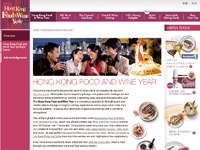 DINE & WINE
DINE & WINE





